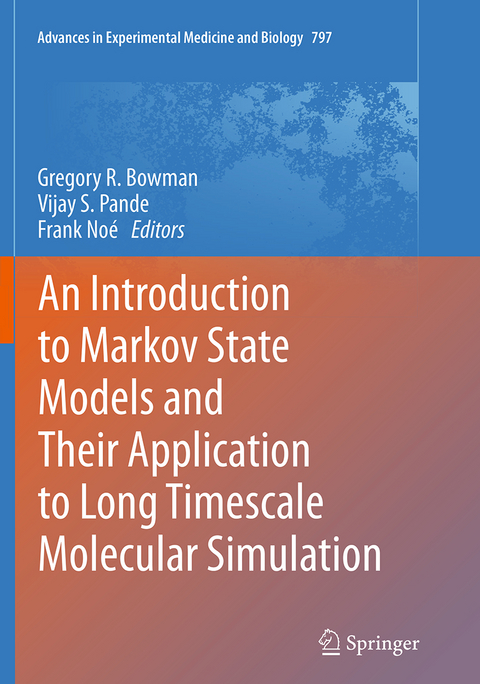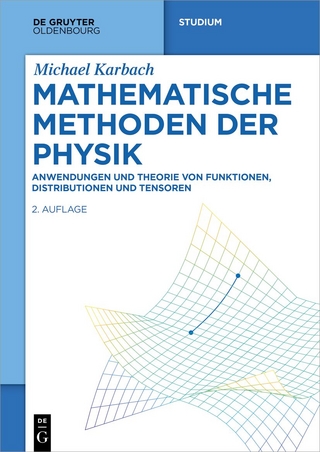
An Introduction to Markov State Models and Their Application to Long Timescale Molecular Simulation
Seiten
2016
|
Softcover reprint of the original 1st ed. 2014
Springer (Verlag)
978-94-024-0762-4 (ISBN)
Springer (Verlag)
978-94-024-0762-4 (ISBN)
This book introduces the mathematical foundations of Markov models and details how they can be used to analyze simulations and drive efficient simulations. It also presents some of the insights these models have yielded in a variety of applications.
The aim of this book volume is to explain the importance of Markov state models to molecular simulation, how they work, and how they can be applied to a range of problems.
The Markov state model (MSM) approach aims to address two key challenges of molecular simulation:
1) How to reach long timescales using short simulations of detailed molecular models.
2) How to systematically gain insight from the resulting sea of data.
MSMs do this by providing a compact representation of the vast conformational space available to biomolecules by decomposing it into states sets of rapidly interconverting conformations and the rates of transitioning between states. This kinetic definition allows one to easily vary the temporal and spatial resolution of an MSM from high-resolution models capable of quantitative agreement with (or prediction of) experiment to low-resolution models that facilitate understanding. Additionally, MSMs facilitate the calculation of quantities that are difficult to obtain from more direct MD analyses, such as the ensemble of transition pathways.
This book introduces the mathematical foundations of Markov models, how they can be used to analyze simulations and drive efficient simulations, and some of the insights these models have yielded in a variety of applications of molecular simulation.
The aim of this book volume is to explain the importance of Markov state models to molecular simulation, how they work, and how they can be applied to a range of problems.
The Markov state model (MSM) approach aims to address two key challenges of molecular simulation:
1) How to reach long timescales using short simulations of detailed molecular models.
2) How to systematically gain insight from the resulting sea of data.
MSMs do this by providing a compact representation of the vast conformational space available to biomolecules by decomposing it into states sets of rapidly interconverting conformations and the rates of transitioning between states. This kinetic definition allows one to easily vary the temporal and spatial resolution of an MSM from high-resolution models capable of quantitative agreement with (or prediction of) experiment to low-resolution models that facilitate understanding. Additionally, MSMs facilitate the calculation of quantities that are difficult to obtain from more direct MD analyses, such as the ensemble of transition pathways.
This book introduces the mathematical foundations of Markov models, how they can be used to analyze simulations and drive efficient simulations, and some of the insights these models have yielded in a variety of applications of molecular simulation.
An overview and practical guide to building Markov state models.- Markov model theory.- Estimation and Validation of Markov models.- Uncertainty estimation.- Analysis of Markov models.-
Transition Path Theory.- Understanding Protein Folding using Markov state models.- Understanding Molecular Recognition by Kinetic Network Models Constructed from Molecular Dynamics Simulations.- Markov State and Diffusive Stochastic Models in Electron Spin Resonance.- Software for building Markov state models.
| Erscheinungsdatum | 02.10.2016 |
|---|---|
| Reihe/Serie | Advances in Experimental Medicine and Biology ; 797 |
| Zusatzinfo | 48 Illustrations, color; 17 Illustrations, black and white; XII, 139 p. 65 illus., 48 illus. in color. |
| Verlagsort | Dordrecht |
| Sprache | englisch |
| Maße | 178 x 254 mm |
| Themenwelt | Mathematik / Informatik ► Mathematik ► Angewandte Mathematik |
| Medizin / Pharmazie ► Studium | |
| Naturwissenschaften ► Biologie ► Genetik / Molekularbiologie | |
| Naturwissenschaften ► Chemie ► Physikalische Chemie | |
| Naturwissenschaften ► Physik / Astronomie | |
| ISBN-10 | 94-024-0762-6 / 9402407626 |
| ISBN-13 | 978-94-024-0762-4 / 9789402407624 |
| Zustand | Neuware |
| Haben Sie eine Frage zum Produkt? |
Mehr entdecken
aus dem Bereich
aus dem Bereich
Buch | Softcover (2024)
Springer Vieweg (Verlag)
44,99 €
Anwendungen und Theorie von Funktionen, Distributionen und Tensoren
Buch | Softcover (2023)
De Gruyter Oldenbourg (Verlag)
69,95 €


